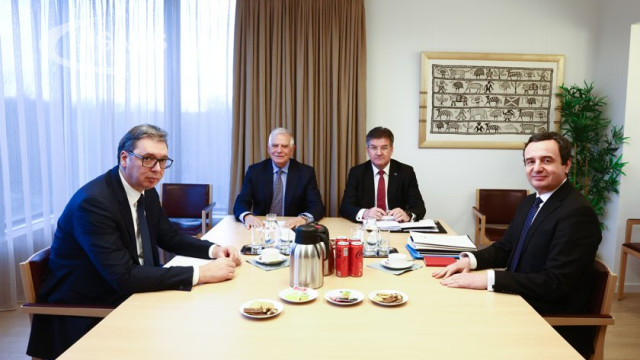An exchange of accusations between the leaders of Serbia and Kosovo marked an emergency session of the UN Security Council. Serbian President Vucic accused the government in Pristina of conducting a policy of systematic terror against Kosovo Serbs. Kurti, in turn, recalled the Serbian policy of genocide in the 1990s, election fraud and Serbia's ties with Russia.
BGNES recalls that the extraordinary session was convened at the request of Belgrade. The request stated that Pristina's recent moves were "in stark contrast to the UN Charter and UNSC Resolution 1244".
Vucic said Pristina was using the term "rule of law" to threaten the survival of Serbs.
Serbia's president said the Kosovo government was carrying out widespread systematic attacks against the Serb community and added that Serbia had reported to the Security Council about the plight of ethnic Serbs in northern Kosovo.
The specific reason this session was requested is Pristina's decision to ban dinars from transactions.
"This measure is primarily an attack on the Serbian population. A huge number of people in Kosovo depend on the income of the Republic of Serbia," Vucic.
"When transactions in dinars are banned, the regime in Pristina will prevent basic funds, the purchase of medicine and the treatment of Serbs," he added.
The Serbian head of state said that this was the reason for the creation of the Association of Serbian Municipalities (ASO) and recalled the 2015 agreement that enabled the financing of the Serbian community in Kosovo.
"The regime in Pristina outlawed the Serbs and now claims that the dinar decision was introduced to introduce the rule of law, although it is clear that it is about persecuting the Serbs. Pristina's leadership resorted to the illegal use of the euro," noted Vucic.
"The position of the Serbs has dramatically deteriorated since the local elections in April, and that is why they are right to boycott these elections. The post-election situation led to protests by local Serbs, to which Albanian armed forces responded by injuring more than 50 people in just one day, followed by the tragic wounding of KFOR soldiers," the Serbian president said.
In turn, Kosovo Prime Minister Albin Kurti said that Serbia is the biggest threat to regional peace and stability. He recalled that "in the 1990s, the government of Serbia ordered and committed genocide in Srebrenica and Kosovo."
"Kosovo has become a multi-ethnic and multicultural republic where there is media freedom and the country's constitution guarantees full protection of minorities," said the head of the Kosovo government.
"We are actively working with the help of non-governmental organizations to strengthen these rights," Kurti said, adding that a new initiative to employ Serbs in northern Kosovo is starting.
He announced the creation of a new Employment Agency in the predominantly Serb region of Leposavic and noted that government meetings are broadcast in both Albanian and Serbian and that the qualifications that Vucic presented have already been compromised as lies.
The Kosovo Prime Minister recalled that the European Parliament, with a resolution from last year, called on the Serbian authorities to refrain from hate speech against Kosovars, as well as from allegations of ethnic cleansing of Serbs in Kosovo. He also referred to the adopted Resolution of the European Parliament regarding the elections in Serbia on December 17.
"Serbia is on Russia's side," Kurti declared.
He insisted that the decision of the Central Bank of Kosovo does not prevent the financing of Serbs by the government of Serbia and that the regulation of the Central Bank of Kosovo requires transparency of transactions according to the laws of Kosovo./BGNES







